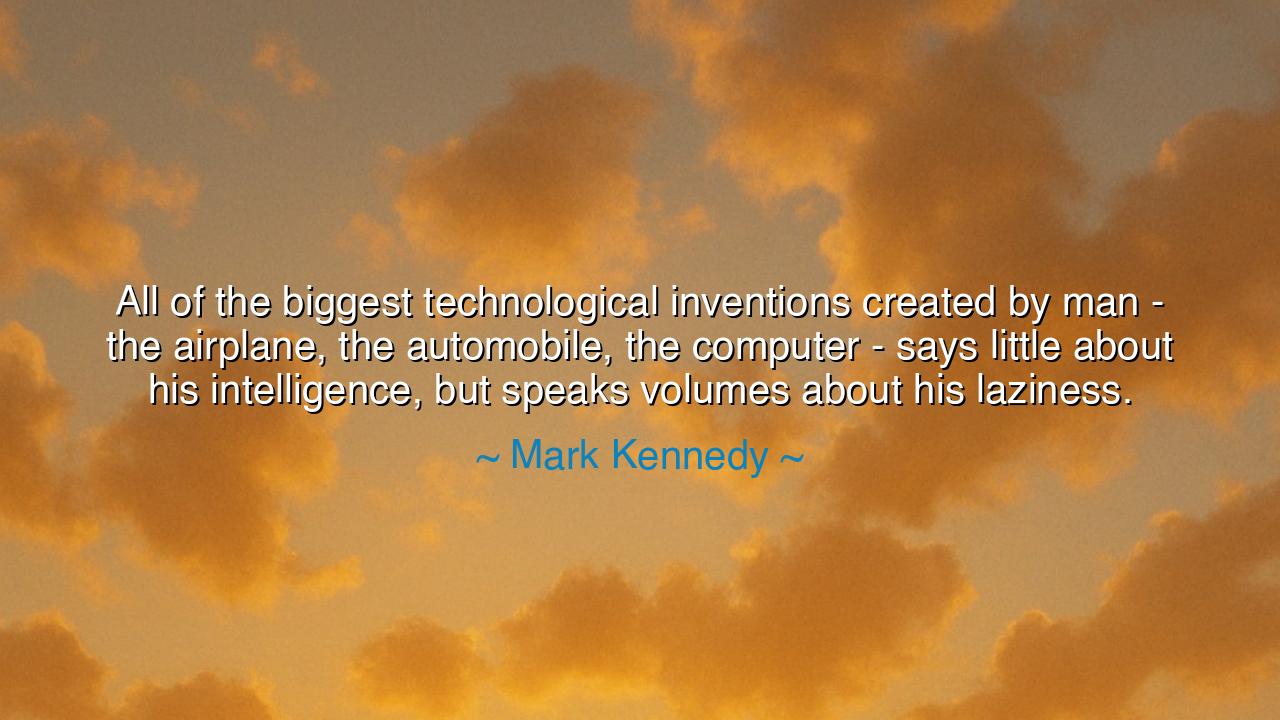
All of the biggest technological inventions created by man - the
All of the biggest technological inventions created by man - the airplane, the automobile, the computer - says little about his intelligence, but speaks volumes about his laziness.






The words of Mark Kennedy — “All of the biggest technological inventions created by man — the airplane, the automobile, the computer — says little about his intelligence, but speaks volumes about his laziness.” — strike like an arrow through the illusions of progress. To many, this quote seems a jest, but beneath its wit lies a deep reflection on the nature of human innovation. It reminds us that invention often springs not from pure intellect or divine genius, but from a restless desire to avoid toil, to make life easier, faster, and more comfortable. Kennedy’s insight reveals a paradox of the modern age: man builds wonders not to test his strength, but to spare himself from effort.
In the ancient world, labor was sacred. The farmer turned the soil with his hands, the artisan carved with patience, the scholar copied manuscripts by candlelight. Each act was slow, deliberate, full of discipline. But as centuries passed, mankind sought to escape the burden of time and effort. When the first wheel was shaped from stone, it was not merely brilliance — it was the cry of a weary back longing for rest. When man dreamt of flying, it was not courage alone that lifted him skyward, but the impatience of one who wished to reach without walking, to soar without struggle. Thus, as Kennedy observes, each invention bears the fingerprints of man’s desire for ease.
Consider Thomas Edison, the great inventor whose light illuminated the night. He was a man of genius, yes — but his motivation was also deeply practical. He sought to banish darkness, to save humanity from the daily ritual of trimming candles and burning oil. His brilliance was guided by a yearning for convenience, the mother of countless inventions. The same was true for Henry Ford, who revolutionized travel not because he worshipped machines, but because he wished to make motion effortless. The automobile did not arise from a thirst for wisdom — it arose from a wish to shorten distance, to trade sweat for speed.
Laziness, then, is not always a vice. In Kennedy’s words, it is both the flaw and the fuel of progress. It is the spark that drives man to imagine tools that do his labor for him. Yet therein lies the warning: for every comfort gained, some strength is lost. When man ceased to walk, he forgot the joy of the journey. When he ceased to calculate by hand, he forgot the beauty of thought. And when he gave his labor to machines, he began to forget himself. Thus, progress, if left unchecked, may dull the very virtues that once defined human greatness — endurance, patience, and skill.
History offers a striking example. When the Roman Empire reached its height, its citizens bathed in luxury. Machines of convenience, servants of abundance, and systems of comfort surrounded them. Yet in their ease, they grew complacent. Their warriors softened, their thinkers idled, their moral fire dimmed. What began as brilliance ended in decline — not for lack of intellect, but for excess of comfort. Kennedy’s quote warns us of this same danger: that in the pursuit of effortless living, humanity risks losing its soul.
But there is another way to read his words — not as condemnation, but as counsel. If laziness reveals our desire to avoid needless pain, then let it be tempered by purpose. Let innovation not merely serve comfort, but cultivate wisdom, compassion, and stewardship. The airplane should not just carry us across the sky; it should carry our understanding across borders. The computer should not only calculate; it should connect hearts and minds. In this balance, laziness transforms into efficiency, and invention becomes not escape, but empowerment.
Therefore, the lesson is clear: honor your inventions, but never let them own your spirit. Use technology as a servant, not as a master. Let the ease it grants you be turned toward higher labors — toward learning, kindness, and creation. For if man uses his tools to flee from effort, he grows weaker; but if he uses them to refine effort, he grows wise. The ancient truth remains — it is not the invention that defines man, but the intention behind it.
So remember, O seeker of comfort: to build is noble, but to grow is divine. Let your intelligence serve your discipline, and your inventions serve your virtue. In this way, the age of machines need not be the death of man’s spirit, but its new awakening — where ease gives rise not to idleness, but to insight, and laziness is redeemed by purpose.






AAdministratorAdministrator
Welcome, honored guests. Please leave a comment, we will respond soon